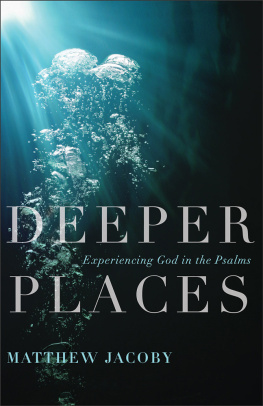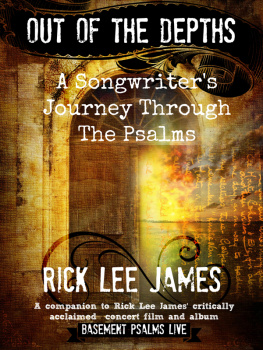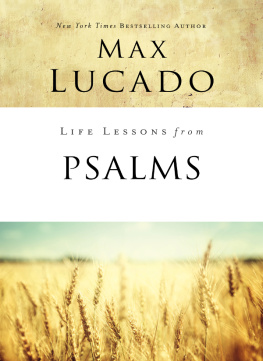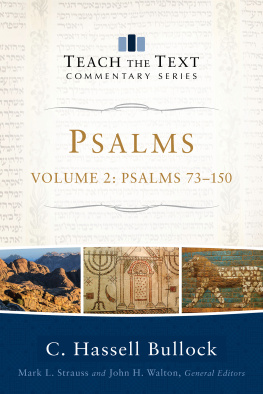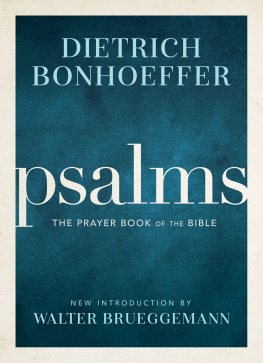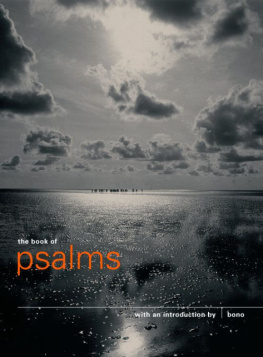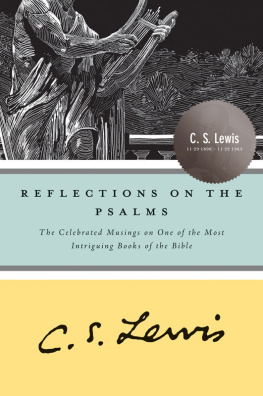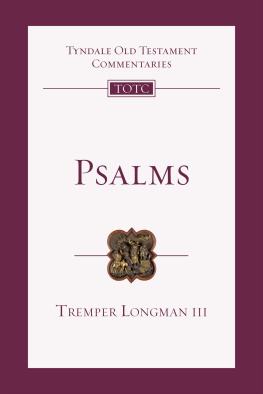Matthew Jacoby - Deeper Places: Experiencing God in the Psalms
Here you can read online Matthew Jacoby - Deeper Places: Experiencing God in the Psalms full text of the book (entire story) in english for free. Download pdf and epub, get meaning, cover and reviews about this ebook. year: 2013, publisher: Baker Publishing Group, genre: Religion. Description of the work, (preface) as well as reviews are available. Best literature library LitArk.com created for fans of good reading and offers a wide selection of genres:
Romance novel
Science fiction
Adventure
Detective
Science
History
Home and family
Prose
Art
Politics
Computer
Non-fiction
Religion
Business
Children
Humor
Choose a favorite category and find really read worthwhile books. Enjoy immersion in the world of imagination, feel the emotions of the characters or learn something new for yourself, make an fascinating discovery.
- Book:Deeper Places: Experiencing God in the Psalms
- Author:
- Publisher:Baker Publishing Group
- Genre:
- Year:2013
- Rating:5 / 5
- Favourites:Add to favourites
- Your mark:
- 100
- 1
- 2
- 3
- 4
- 5
Deeper Places: Experiencing God in the Psalms: summary, description and annotation
We offer to read an annotation, description, summary or preface (depends on what the author of the book "Deeper Places: Experiencing God in the Psalms" wrote himself). If you haven't found the necessary information about the book — write in the comments, we will try to find it.
Deeper Places: Experiencing God in the Psalms — read online for free the complete book (whole text) full work
Below is the text of the book, divided by pages. System saving the place of the last page read, allows you to conveniently read the book "Deeper Places: Experiencing God in the Psalms" online for free, without having to search again every time where you left off. Put a bookmark, and you can go to the page where you finished reading at any time.
Font size:
Interval:
Bookmark:

Cover
Title Page
Copyright Page
Free Download
Introduction
1. The Richness of Complexity
2. The Art of Reorientation
3. The Pursuit of Sadness
4. The Joy of Brokenness
5. Optimistic Realism
6. The Anatomy of Happiness
7. Creative Contradictions
8. The Waiting Room
9. The Liberation of Desire
10. The Happiest Man
11. The Rest of Worship
12. The Power of Debt
13. Joy Is Love
14. The Praise of Enjoyment
15. The Flight of Joy
Conclusion
About the Author
Back Ad
Back Cover
Download two FREE songs from the world-acclaimed Sons of Korah .
Visit www.mytune.co and when prompted, enter in the Promo Code field 15205 .
Then enter your name, city, state, and country along with your email address. You will then be emailed a secure link to download your FREE MP4 files from Sons of Korah.
[mytune.co is owned and managed by Sons of Korah. Your details will not be shared with any other organizations.]
How lovely is your dwelling place,
O L ORD Almighty!
My soul yearns, even faints,
for the courts of the L ORD ;
my heart and my flesh cry out
for the living God.
Psalm 84:12
In Search of Reality
I feel nothing. That is how many Christians would honestly respond when asked how they really feel about God. Beyond brief moments of inspiration and a basic underlying conviction, most people struggle to attain anything more than a remote and abstract idea about God. It is a symptom of a faith focused on concepts and propositions rather than real, personal encounter. We are children of our scientific culture, a culture obsessed with information about things. So we find our minds crammed with ideas about God, with concepts and facts about who God is and what he has done, but too often the reality of God is as remote to us as the reality of black holes and supernovas. It is little wonder, then, that we have no emotional connection with these facts. They are as abstract as a mathematical equation. It is true that three plus two equals five, but I cannot summon up any passion for that truth. I cannot love an idea. I can only love a person with whom I have some experience.
The Bible tells us that we can have a real relationship with the real God. In fact, this is commonly and correctly upheld by theologians to be the main purpose of human life: to know God, to glorify God, to enjoy God. The Good News is that no matter what we have or havent done, we have access to God through Jesus Christ, who paid for all our sins. If we put our faith in him, we can become Gods children.
If you have been a Christian for some time, you no doubt have heard this Good News again and again from hundreds of different angles. You probably have also been encouraged to delight in this message, to share it with others as the most wonderful news in the world, and even to rejoice in this message by singing songs of praise and thanks to God for what he has done. But what do you feel? Do you feel anything?
It may well be that the more you hear this message the more aggravatingly boring it becomes precisely because the only thing you feel when you hear it is the pressure to feel something you just dont feel. It can be like people continually telling you about a wonderful place but not telling you how to get there, or whether it is even possible to get there. As long as the Good News remains a matter of abstract facts, it will have little more effect on your life than your insurance policy has on the way you drive.
Great Expectations
I get the impression sometimes that a relationship with God, for many Christians, means little more than the possession of a spiritual status that gives them assurance of going to heaven when they die. In this case, being adopted as a child of God is more about knowing where one stands with God than actually knowing God himself in the relational sense. The whole thing is abstract and removed, as though the object of faith is a great contract in heaven rather than a person. Perhaps Christians tend to think like this because they have accommodated their expectations to their lack of real, personal experience. They have tried to normalize their failure to engage with God.
If we believe that Jesus has given us access to God, to be children of God and to love and be loved by God, then the clear implication is that we should not be content with knowing about God. We should not be content with anything less than knowing God with greater intimacy and more experiential engagement than we know and experience with any other person. Is such a thing possible? I imagine there is probably little within you that feels this to be in reach. You have probably accommodated your expectations to what you lack. It is difficult to live with a conviction about God while lacking any sense of real engagement with God. It is difficult to live in continual spiritual frustration, so we tend to lower our expectations and then try to justify those lowered expectations.
We will find lots of literature to help us justify our lowered expectations of God, but we wont find any in the Bible. The more we read the Bible, the harder we will have to work to maintain low expectations of God. For example, if Moses could speak with God face to face, as a man speaks with his friend (Exod. 33:11), how can we possibly justify an expectation of a lesser experience for us now? Is Gods plan regressive? Are we to believe that what we have now is less than what Moses had? The more we read the Bible, the more frustrated we will get by the gaping incongruity between what is promised to us and what we actually have. This will bring us to a crucial junction of decision, and it is here that many people take the wrong turn.
Many people make the mistake of assuming that this tension between promise and reality is something to be avoided, that they must either lower their expectations of God or convince themselves that they have something they clearly dont have. But this very tension is a crucial element in the formation of a spiritual capacity to know God. I will say more about this in the following chapters, but suffice it to say now that the common avoidance of the tension between human reality and divine promise is evidence that we may have adopted inadequate notions of the spiritual life, to say the least. If we feel compelled to lower our expectations or embrace delusions in response to this tension, it is only because the expectations we had in the first place were seriously contaminated. It is not that we can ever have too high expectations of God. The contamination of our expectations is our misunderstanding of the process by which we attain what the Bible promises. It is not so much what we expect that is the initial problem but how we expect to get there. The failure of bad processes so often leads to disillusionment, which in turn leads to severely stunted expectations.
Beyond Token Piety
Read the Bible and pray. That is the nutshell prescription I was given as a young Christian for building my personal relationship with God. It is simple and achievable. You read Gods Word, and you pray for yourself and others. That advice will get us started, but it wont be long before we realize that the spiritual journey, the experience of relating to God, is far from simple.
Due to the complexities of our dysfunctional hearts, we all begin our journey with God in the middle of a vast spiritual labyrinth. There is a sense of simplicity to be gained in the spiritual life, but it is not where we begin. If we make the spiritual life a simple matter of achieving goals using step-by-step processes and daily habits, it becomes more about personal achievement than real relationship. It is so easy, then, for the spiritual life to become little more than a religion of token gestures of piety that only serve to make us feel we have fulfilled our duty toward God. We should indeed read our Bibles and pray, but this advice is just too simplistic to be helpful to anyone who really wants to have a deep relationship with God.
Font size:
Interval:
Bookmark:
Similar books «Deeper Places: Experiencing God in the Psalms»
Look at similar books to Deeper Places: Experiencing God in the Psalms. We have selected literature similar in name and meaning in the hope of providing readers with more options to find new, interesting, not yet read works.
Discussion, reviews of the book Deeper Places: Experiencing God in the Psalms and just readers' own opinions. Leave your comments, write what you think about the work, its meaning or the main characters. Specify what exactly you liked and what you didn't like, and why you think so.

